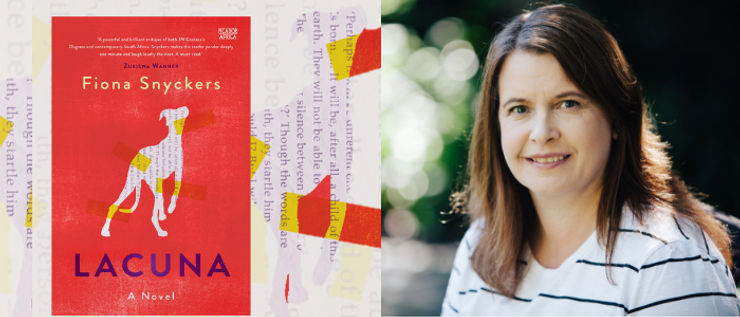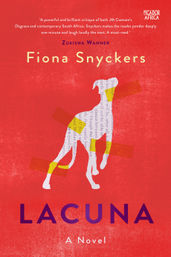Fiona Snyckers on writing her award-winning novel, Lacuna
"In order to be completely fearless, I had to write as though I would be the only person ever to read it. That gave me the freedom to explore issues of sexuality, trauma and identity in an unconstrained way." Fiona Snyckers on her award-winning novel, Lacuna.

Lucy is no one’s lacuna. Her attempts to claw back her life, her voice and agency may be messy and misguided, but she won’t be silenced. Her rape is not a metaphor. This is her story. Written from the point of view of Lucy Lurie, Fiona Snyckers discusses her highly-charged novel, Lacuna, winner of 2020 National Institute for Humanities and Social Sciences Award in the Fiction - Best Novel category.
Please introduce Lacuna…
Lacuna is a metatextual response to JM Coetzee’s Disgrace. It is written from the perspective of Lucy Lurie who takes issue with the way a celebrated male author, John Coetzee, has chosen to represent her experience of having been gang raped. It asks the question, ‘Does any writer have the right to tell any story’? It is also a story of healing from trauma, and of negotiating the complexities of being white in post-apartheid South Africa.
Which book/s do you find yourself returning to and why?
I am entranced by EF Benson’s Lucia books from the 1930s. They are masterpieces of comic fiction. I reread them every few years and consider them a major influence on my work.
How has writing Lacuna been different from writing YA/your other books?
For the first time in my career, I wrote without an intended reader in mind. In order to be completely fearless, I had to write as though I would be the only person ever to read it. That gave me the freedom to explore issues of sexuality, trauma and identity in an unconstrained way.
What were your first thoughts after you finished reading Disgrace?
I quickly realised that the rape of Lucy Lurie functioned as a metaphor for the overthrow of white supremacy in South Africa. I was struck by how flawed that metaphor was in that it portrayed white South Africans as somehow equivalent to a woman who has suffered a gang rape. The truth is that white South Africans have, by every possible metric, flourished as never before during the post-Apartheid years. Coetzee’s fantasy that a mixed-race baby will somehow be unencumbered by history and become the future of this country struck me as equally flawed.
Disgrace was originally published in 1999, is there a particular reason you waited till 2019 to write Lacuna? Why was it important to put it out now?
It took a long time for my response to Disgrace to solidify into its current coherent form. The idea of writing a fictionalized response to it only occurred to me a few years ago. The fact that this year is the twentieth anniversary of the publication of Disgrace was coincidental.
How long did it take you to write Lacuna?
Approximately three years.
Selected by Fiona, here are five quotes from Lacuna that capture Lucy Lurie’s story.
- "Glasses can be smashed, and the resultant shards can be used to pierce skin. I switched to plastic crockery and glassware more than a year ago."
- "She takes upon her body the sins of apartheid like some dungaree-wearing lamb of God. What utter, utter garbage."
- "When an unreliable narrator is your only window into a story, you have to take some of what he says on trust."
- "It turns out that the prospect of losing one’s privilege is the biggest terror of all."
- "The thought of anything taking root inside my body was an abomination to me. It would have felt like a cancer, not a baby. "
Discover Lacuna, watch the book trailer and read the first chapter of the book HERE
Lacuna
by Fiona Snyckers
Lucy Lurie is deeply sunk in PTSD following a gang rape at her father’s farmhouse in the Western Cape. She becomes obsessed with the author John Coetzee, who has made a name for himself by writing Disgrace, a celebrated novel that revolves around the attack on her. Lucy lives the life of a celibate hermit, making periodic forays into the outside world in her attempts to find and confront Coetzee.
The Lucy of Coetzee’s fictional imaginings is a passive, peaceful creature, almost entirely lacking in agency. She is the lacuna in Coetzee’s novel – the missing piece of the puzzle.
Lucy Lurie is no one’s lacuna. Her attempts to claw back her life, her voice and her agency may be messy and misguided, but she won’t be silenced. Her rape is not a metaphor. This is her story.
